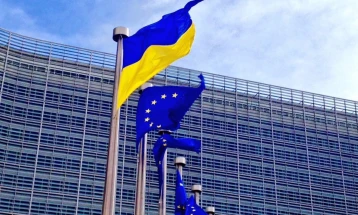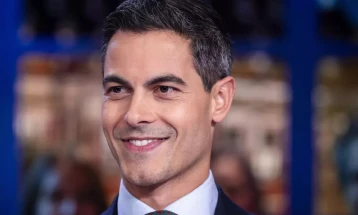Salman Rushdie ‘on ventilator and could lose eye’ after attack in US

London, 13 August 2022 (PA Media/dpa/MIA) – Salman Rushdie is reportedly on a ventilator and may lose an eye after he was stabbed on stage in New York state.
The 75-year-old Indian-born British author sustained nerve damage to his arm and damage to his liver, according to the New York Times (NYT).
New York state police have named the suspected attacker as Hadi Matar, 24, of Fairview, New Jersey, who was taken into custody following the incident.
Rushdie, whose writing led to death threats from Iran in the 1980s, was about to deliver a lecture at the Chautauqua Institution, in Chautauqua some 65 miles south-west of Buffalo, when the incident occurred.
He was stabbed at least once in the neck and once in the abdomen, according to police officials, before he was taken to hospital.
According to the NYT, Rushdie’s agent Andrew Wylie said he is on a ventilator and unable to speak.
Wylie added the news was “not good” and the author will “likely lose one eye.”
He said the nerves in Rushdie’s arm were severed in the attack and his liver was “stabbed and damaged.”
Major Eugene Staniszweski of New York State Police said late on Friday: “Earlier today at approximately 10:47 am (1447 GMT), guest speaker Salman Rushdie, aged 75, and Ralph Henry Reese, age 73, had just arrived on stage at the institution.
“Shortly thereafter, the suspect jumped on to the stage and attacked Mr Rushdie, stabbing him at least once in the neck and at least once in the abdomen.
“Several members of the staff at the institution and audience members rushed the suspect and took him to the ground, and shortly thereafter, a trooper who was at the institution took the suspect into custody with the assistance of a Chautauqua County Sheriff’s deputy.
“Mr Rushdie was provided medical treatment by a doctor who was in the audience until EMS arrived on scene.
“Mr Rushdie was airlifted to a local trauma centre and is still currently undergoing surgery.”
His book "The Satanic Verses" has been banned in Iran since 1988, as many Muslims view it as blasphemous, and its publication prompted Iran’s then-leader Ayatollah Khomeini to issue a fatwa calling for his death.
Reese, from the City of Asylum organization, a residency programme for writers living in exile under threat of persecution, suffered a minor head injury.
They were due to discuss the role of the US as an asylum for writers and other artists in exile and as a home for freedom of creative expression.
New York governor Kathy Hochul told a press conference that a state police officer saved Rushdie’s life.
She added: “He is alive, he has been airlifted to safety. But here is an individual who has spent decades speaking truth to power, someone who’s been out there unafraid, despite the threats that have followed him his entire adult life.”
The Chautauqua Institution, which was hosting the lecture, tweeted about the incident, writing: “We ask for your prayers for Salman Rushdie and Henry Reese, and patience as we fully focus on co-ordinating with police officials following a tragic incident at the amphitheatre today.”
Its president Michael Hill said: “What we experienced at Chautauqua today is an incident unlike anything in our nearly 150-year history.
“We were founded to bring people together and community to learn and in doing so, to create solutions through action, to develop empathy and to take on intractable problems.
“Today now we’re called to take on fear and the worst of all human traits: hate.”
Jeremy Genovese, 68, from Beachwood, Ohio, a retired academic from Cleveland State University, told the PA news agency he arrived at the amphitheatre as it was being evacuated and people were “streaming out.”
He said: “People were in shock, many people in tears. Chautauqua has always prided itself as a place where people can engage in civil dialogue.
“The amphitheatre is a large outdoor venue where people have given lectures since the late 1800s. You need a pass to access the grounds but it is not too difficult to get in.”
Rushdie’s publisher Penguin Random House said they are “deeply shocked and appalled” by the incident.
Chief executive Markus Dohle said in a statement to PA: “We are deeply shocked and appalled to hear of the attack on Salman Rushdie while he was speaking at the Chautauqua Institution in New York.
“We condemn this violent public assault, and our thoughts are with Salman and his family at this distressing time.”
"[I am] appalled that Rushdie Rushdie has been stabbed while exercising a right we should never cease to defend," Prime Minister Boris Johnson said.
He added: “Right now my thoughts are with his loved ones. We are all hoping he is okay.”
US National Security Adviser Jake Sullivan said: “Today, the country and the world witnessed a reprehensible attack against the writer Salman Rushdie. This act of violence is appalling.
“All of us in the Biden-Harris Administration are praying for his speedy recovery. We are thankful to good citizens and first responders for helping Mr Rushdie so quickly after the attack and to law enforcement for its swift and effective work, which is ongoing.”
Rushdie was previously president of PEN America, which celebrates free expression and speech, and its chief executive Suzanne Nossel was among those reacting to the attack.
She tweeted: “PEN America is reeling from shock and horror at word of a brutal, premeditated attack on our former president and stalwart ally, Salman Rushdie.”
She added: “Our thoughts and passions now lie with our dauntless Salman, wishing him a full and speedy recovery. We hope and believe fervently that his essential voice cannot and will not be silenced.”
Rushdie began his writing career in the early 1970s with two unsuccessful books before "Midnight’s Children," about the birth of India, which won the Booker Prize in 1981.
It went on to bring him worldwide fame and was named “best of the Bookers” on the literary award’s 25th anniversary.
The author lived in hiding for many years in London under a British government protection programme after Ayatollah Khomeini issued a fatwa calling for his death over "The Satanic Verses."
Finally, in 1998, the Iranian government withdrew its support for the death sentence and Rushdie gradually returned to public life, even appearing as himself in the 2001 hit film "Bridget Jones’s Diary."
The Index on Censorship, an organization promoting free expression, said money was raised to boost the reward for Rushdie’s killing as recently as 2016, underscoring that the fatwa for his death still stands.
His other works include "The Moor’s Last Sigh" and "Shalimar The Clown," which was long-listed for the Booker.
He was knighted in 2008 and earlier this year was made a member of the Order of the Companions of Honour as part of the Queen’s Birthday Honours.







